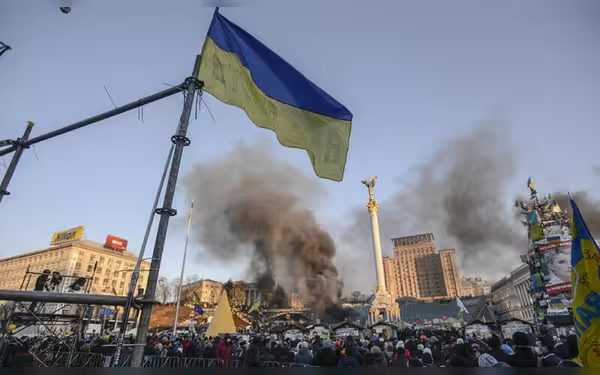Saturday, November 16, 2024 05:55 PM
China and Brazil Push for Ukraine Peace Plan Amid Zelensky's Opposition
- China and Brazil seek support for Ukraine peace plan.
- Zelensky criticizes plan as benefiting Moscow.
- Emerging powers emphasize protecting civilian infrastructure.
 Image Credits: dawn
Image Credits: dawnChina and Brazil are advocating for a peace plan in Ukraine, facing criticism from Zelensky, who views it as favoring Moscow.
In a significant diplomatic move, China and Brazil are actively working to rally support from developing nations for a peace plan aimed at resolving the ongoing conflict in Ukraine. This initiative comes despite strong opposition from Ukrainian President Volodymyr Zelensky, who has publicly criticized the plan, labeling it as a strategy that primarily benefits Moscow. Zelensky's remarks during his address at the United Nations highlighted his concerns, equating the pressure to accept a peace deal with a form of colonialism.
During a recent meeting held on the sidelines of the United Nations General Assembly, which was attended by representatives from seventeen countries, Chinese Foreign Minister Wang Yi and Brazilian foreign policy adviser Celso Amorim led discussions focused on preventing further escalation of the war. Wang emphasized the importance of avoiding the use of weapons of mass destruction and protecting nuclear power plants from potential attacks. He stated, "Russia and Ukraine are neighbours that cannot be moved away from each other and amity is the only realistic option." This sentiment underscores the necessity for dialogue and cooperation between the two nations.
In addition to China and Brazil, ten other countries from the Global South, including Indonesia, South Africa, and Turkiye, participated in the meeting and signed a communique that builds upon a six-point plan proposed earlier by Brazil and China in May. Amorim mentioned that these countries would continue to convene in New York under a grouping referred to as "friends for peace." This collaborative effort reflects a growing desire among developing nations to play a more active role in global peace initiatives.
In a pointed critique of Russian President Vladimir Putin, the joint statement from China and Brazil called for a halt to any threats or use of nuclear weapons in the context of the Ukraine conflict. The statement read, "We call on refraining from the use or the threat of weapons of mass destruction, particularly nuclear weapons and chemical and biological weapons." This call for restraint comes in light of Putin's recent threats to use nuclear weapons in response to significant attacks on Russian territory, as Ukraine seeks Western support to enhance its military capabilities.
Just days after Zelensky accused Russia of planning attacks on Ukraine's nuclear reactors, the emerging powers reiterated the importance of protecting civilian infrastructure. They stated, "Civilian infrastructures, including peaceful nuclear facilities and other energy facilities, should not be the targets of military operation." This assertion highlights the critical need for safeguarding essential services and facilities during times of conflict.
It is worth noting that Chinese President Xi Jinping had previously established a "no limits" partnership with Putin in 2022, shortly before the Russian invasion of Ukraine. While Beijing maintains that it has not supplied weapons to Russia for use in Ukraine, Western nations have raised concerns about Chinese companies providing materials that could be utilized in the production of weapons for the ongoing war.
As the situation in Ukraine continues to evolve, the efforts by China and Brazil to mediate and promote peace reflect a broader trend of emerging powers seeking to assert their influence on the global stage. The complexities of international relations, particularly in conflict zones, require a delicate balance of diplomacy and strategic interests. The world watches closely as these nations navigate the challenging landscape of peace negotiations, hoping for a resolution that prioritizes stability and security for all involved.













